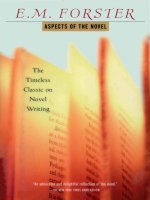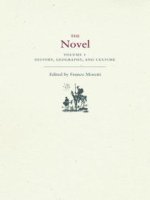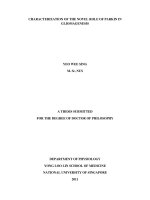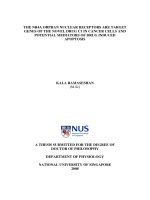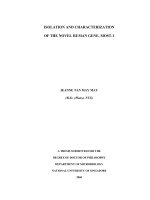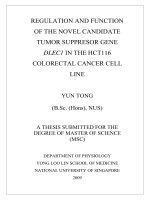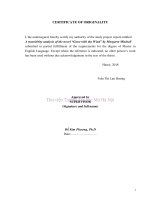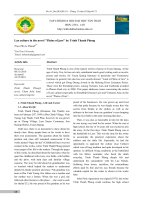the novel pan
Bạn đang xem bản rút gọn của tài liệu. Xem và tải ngay bản đầy đủ của tài liệu tại đây (565.99 KB, 136 trang )
TheProjectGutenbergEBookofPan,byKnutHamsun
ThiseBookisfortheuseofanyoneanywhereatnocostandwith
almostnorestrictionswhatsoever.Youmaycopyit,giveitawayor
re-useitunderthetermsoftheProjectGutenbergLicenseincluded
withthiseBookoronlineatwww.gutenberg.org
Title:Pan
Author:KnutHamsun
Commentator:EdwinBjörkman
Translator:W.W.Worster
ReleaseDate:January,2005[EBook#7214]
ThisfilewasfirstpostedonMarch27,2003
LastUpdated:March15,2018
Language:English
***STARTOFTHISPROJECTGUTENBERGEBOOKPAN***
TextfileproducedbyTimBecker,EricEldred,CharlesFranks,and
theOnlineDistributedTeam
HTMLfileproducedbyDavidWidger
PAN
ByKnutHamsun
TranslatedfromtheNorwegianofKnutHamsunByW.W.Worster
WithanIntroductionbyEdwinBjörkman
NewYork
AlfredA.Knopf
1927
PublishedJuly,1921
SecondprintingAugust,1921
ThirdprintingSeptember,1921
FourthprintingFebruary,1922
FifthprintingJanuary,1927
CONTENTS
KNUTHAMSUN:FROMHUNGERTOHARVEST
PAN
I
II
III
IV
V
VI
VII
VIII
IX
X
XI
XII
XIII
XIV
XV
XVI
XVII
XVIII
XIX
XX
XXI
XXII
XXIII
XXIV
XXV
XXVI
XXVII
XXVIII
XXIX
XXX
XXXI
XXXII
XXXIII
XXXIV
XXXV
XXXVI
GLAHN'SDEATH
I
II
III
IV
V
KNUTHAMSUN:FROMHUNGERTOHARVEST
Between“Hunger”and“GrowthoftheSoil”liesthetimegenerallyallottedto
a generation, but at first glance the two books seem much farther apart. One
expressesthepassionaterevoltofahomelesswandereragainsttheconventional
routine of modern life. The other celebrates a root-fast existence bounded in
everydirectionbymonotonouschores.Theissuanceoftwosuchbooksfromthe
same pen suggests to the superficial view a complete reversal of position. The
truth, however, is that Hamsun stands today where he has always stood. His
objectiveisthesame.Ifhehaschanged,itisonlyintheintensityofhisfeeling
andthemodeofhisattack.What,aboveall,hehatesandcombatsistheartificial
uselessness of existence which to him has become embodied in the life of the
cityasopposedtothatofthecountry.
ProblemsdonotenterintothenovelsofHamsuninthesamemannerasthey
didintotheplaysofIbsen.Hamsunwouldseemtotakelifeasitis,notwithany
pretense at its complete acceptability, but without hope or avowed intention of
makingitover.Ifhistolerancebeneverfreefromsatire,hissatireisontheother
hand always easily tolerant. One might almost suspect him of viewing life as
something static against which all fight would be futile. Even life's worst
brutalitiesarerelatedwithanoffhandednessofmannerthatmakesyoulookfor
thejokethatmustbeatthebottomofthem.Thewordreformwouldseemtobe
strangelyeliminatedfromhisdictionary,or,ifpresent,itmightbefounddefined
asahumorousconceptionofsomethingintrinsicallyunachievable.
Hamsun would not be the artist he is if he were less deceptive. He has his
problems no less than Ibsen had, and he is much preoccupied with them even
whenheappearslostinribaldlaughter.TheyaredifferentfromIbsen's,however,
andinthatdifferenceliesoneofthechiefexplanationsofHamsun'spositionas
anartist.AllofIbsen'sproblemsbecameinthelastinstancereducibletoasingle
relationship—that between the individual and his own self. To be himself was
hiscryandhistask.Withthisconsummationinview,heplumbedeverydepthof
humannature.Thisonethingachieved,allelsebecameinsignificant.
Hamsun begins where Ibsen ended, one might say. The one problem never
consciouslyraisedbyhimasaproblemisthatofman'sdutyorabilitytoexpress
his own nature. That is taken for granted. The figures populating the works of
Hamsun, whether centrally placed or moving shadowlike in the periphery, are
firstofallthemselves—agressively,inevitably,unconsciouslyso,Inotherwords,
theyareliketheircreator.Theymayperishtragicallyorridiculouslyasaresult
oftheircommoninabilitytolayviolenthandontheirownnatures.Theymaygo
through life warped and dwarfed for lack of an adjustment that to most of us
mightseembotheasyandnatural.Theirownselvesmaybecomemoreclearly
revealedtothembyharshorhappycontactswithlife,andtheymaychangetheir
surfacesaccordingly.Theonethingneveroccurringtothemisthattheymight,
for the sake of something or some one outside of themselves, be anything but
whattheyare.
Thereareinterferences,however,anditisfromthesethatHamsun'sproblems
spring.Amanmayprosperorsufferbybeinghimself,andinneithercaseisthe
fault his own. There are factors that more or less fatally influence and
circumscribethesupremelyimportantfactorthatishisownself.Roughlythese
fall into three groups suggestive of three classes of relationships: (1) between
manandhisgeneralenvironment;(2)betweenmanandthatever-presentforce
of life which we call love; and (3) between man and life in its entirety, as an
omnipotence that some of us call God and others leave unnamed. Hamsun's
deceptivepreferenceforindirectnessisshownbythefactthat,whilehetriesto
make us believe that his work is chiefly preoccupied with problems of the
secondclass,hismindisreallybusywiththoseofthefirstclass.Theexplanation
is simple. Nothing helps like love to bring out the unique qualities of a man's
nature.Ontheotherhand,thereisnothingthatdoesmoretopreventamanfrom
beinghimselfthantherutsofhabitintowhichhisenvironmentalwaystendsto
drive him. There are two kinds of environment, natural and human. Hamsun
appears to think that the less you have of one and the more of the other, the
better for yourself and for humanity as a whole. The city to him is primarily
concentrated human environment, and as such bad. This phase of his attitude
toward life almost amounts to a phobia. It must be connected with personal
experiencesofunusualdepthandintensity.Perhapsitoffersakeythatmaybe
well worth searching for. Hamsun was born in the country, of and among
peasants.Insuchsurroundingshegrewup.Theremovalofhisparentsfromthe
central inland part of Norway to the rocky northern coast meant a change of
naturalsetting,butnotahumancontact.Theseamusthavecomeintohislifeas
arevelation,andyetitplaysanastonishinglysmallpartinhiswork.Itisalways
present,butalwaysinthedistance.Youhearofit,butyouarenevertakentoit.
Ataboutfifteen,Hamsunhadanexperiencewhichisrarelymentionedaspart
ofthescantbiographicalmaterialmadeavailablebyhisreserveconcerninghis
own personality. He returned to the old home of his parents in the Gudbrand
Valleyandworkedforafewmonthsasclerkinacountrystore—astorejustlike
anyoneofthosethatfiguresoconspicuouslyinalmosteveryoneofhisnovels.
Theplaceandtheworkmusthavemadearevolutionaryimpressiononhim.It
apparently aroused longings, and it probably laid the basis for resistances and
resentmentsthatlaterblossomedintoweedlikeabundanceashecameincontact
withrealcitylife.Thererunsthroughhisworkastrangesenseofsympathyfor
the little store on the border of the wilderness, but it is also stamped as the
forerunnerandpandereroftheluresofthecity.
As a boy of eighteen, when working in a tiny coast town as a cobbler's
apprentice,heventureduponhisfirstliteraryendeavorsandactuallymanagedto
get two volumes printed at his own cost. The art of writing was in his blood,
exercisingacallandacommandthatmusthavebeenfeltasapainattimes,and
asaconsecrationatothertimes.Booksandwritingwereconnectedwiththecity.
Perhapsthehatredthatlaterdaysdeveloped,haditsrootsinathwartedpassion.
Even in the little community where his first scribblings reached print he must
have felthimselfinurbansurroundings,andperhapsthosefirstcrudevolumes
drew upon him laughter and scorn that his sensitive soul never forgot. If
something of the kind happened, the seed thus sown was nourished plentifully
afterwards, when, as a young man, Hamsun pitted his ambitions against the
indifferencefirstofChristianiaandthenofChicago.Theresultwasadefeatthat
seemed the more bitter because it looked like punishment incurred by straying
afterfalsegods.
Othershavesufferedinthesameway,although,beinglessrigidlythemselves,
theymaynot,likeHamsun,havetakenaperversepleasureindrivinghomethe
pointoftheagony.Othershavethoughtandsaidharshthingsofthecities.But
noonethatIcanrecallhasequalledHamsuninhismercilessdenunciationofthe
veryprincipleofurbanity.ThetruthofitseemstobethatHamsun'spilgrimage
to the bee hives where modern humanity clusters typically, was an essential
violationofsomethingwithinhimselfthatmatteredevenmorethanhisliterary
ambition to his soul's integrity. Perhaps, if I am right, he is the first genuine
peasant who has risen to such artistic mastery, reaching its ultimate heights
through a belated recognition of his own proper settings. Hamsun was sixty
whenhewrote“GrowthoftheSoil.”Itisthefirstworkinwhichhecelebrates
thelifeoftheopencountryforitsownsake,andnotmerelyasacontrasttothe
artificiality and selfishness of the cities. It was written, too, after he had
definitely withdrawn himself from the gathering places of the writers and the
artiststogiveanequalshareofhistimeandattentiontothetillingofthesoilthat
wasatlasthisown.Itistheharvestofhisultimateself-discovery.
The various phases of his campaign against city life are also interesting and
illuminating.Earlyinhiscareerasawriterhetriedanopenattackinfullforce
byacoupleofnovels,“ShallowSoil”and“EditorLynge”,dealingsarcastically
with the literary Bohemia of the Norwegian capital. They were, on the whole,
failures—artistically rather than commercially. They are among his poorest
books.Theattackwasneverrepeatedinthatform.Heretiredtothecountry,so
to speak, and tried from there to strike at what he could reach of the ever
expanding,everdevouringcity.Afterthatthecity,likethesea,isalwaysfound
inthedistance.Onefeelsitwithouteverseeingit.Thereisfearaswellashatred
inhistreatmentofit.
Inthecountryitisrepresentednotsomuchbythestore,which,afterall,fills
an unmistakable need on the part of the rural population, as by the
representativesofthevariousprofessions.FortheseHamsunentertainsahostile
feelinghardlylessmarkedthanthatbestowedontheirplaceoforigin,whither,
to his openly declared disgust, they are always longing. It does not matter
whethertheyareministersoractors,lawyersordoctors—theyarealltarredwith
thesamebrush.Theircommoncharacteristicistheirrootlessness.Theyhaveno
realhome,becausetoHamsunahomeisunthinkableapartfromaspaceofsoil
possessedincontinuitybysuccessivegenerations.Theyarealwaysdespisingthe
surroundingsinwhichtheyfindthemselvestemporarily,andtheirchiefclaimto
distinction is a genuine or pretended knowledge of life on a large scale.
Greatness is to them inseparably connected with crowdedness, and what they
call sophistication is at bottom nothing but a wallowing in that herd instinct
whichtakestheplaceofmankind'sancientantagonistinHamsun'sbooks.Above
all,theirstandardsofjudgmentarenottheirown.
FromwhathasjustbeensaidonemightconcludethatthespiritofHamsunis
fundamentallyunsocial.Soitis,inaway,butonlyinsofaraswehavecometo
thinkofsocialandurbanasmoreorlessinterchangeableterms.Hehasasocial
consciousnessandasocialpassionofhisown,butitisdecentralized,onemight
say.HeknowsofnogreatermanthanhisownIsakof“GrowthoftheSoil”—a
simplepioneerinwhosewakenewhomesspringup,aninarticulateanduncouth
personificationofman'smasteryofnature.WhenHamsunspeaksofIsakpassing
across the yearning, spring-stirred fields, “with the grain flung in fructifying
waves from his reverent hands,” he pictures it deliberately in the light of a
religiousrite—theoldestandmostsignificantknowntoman.Itisasiftheman
who starved in Christiania and the western cities of the United States—not
figuratively, but literally—had once for all conceived a respect for man's
principal food that has colored all subsequent life for him and determined his
own attitude toward everything by a reference to its connection or lack of
connectionwiththatsubstance.
Taking it all in all, one may well call Hamsun old-fashioned. The virtues
winninghispraiseandtheconditionsthatstirhislongingsarenotofthepresent
day. There is in him something primitive that forms a sharp contrast to the
modernity of his own style. Even in his most romantic exaggerations, as in
“Hunger” and “Mysteries,” he is a realist, dealing unrelentingly with life as it
appearstous.Itwouldhardlybetoomuchtocallhismethodscientific.Buthe
usesittoaimtremendousexplosivechargesatthosehumanconcentrationsthat
made possible the forging of the weapons he wields so skilfully. Nor does he
stop at a wish to see those concentrations scattered. The very ambitions and
Utopiasbredwithinthemareanathematohissoul,thatplacessimplicityabove
cleanlinessindivineproximity.Characteristicallywefindthattheonearttreated
with constant sympathy in his writings is that of music, which probably is the
earliestandcertainlytheoneleastdependentontheherdingofmeninbarracks.
In place of what he wishes to take away he offers nothing but peace and the
sense of genuine creation that comes to the man who has just garnered the
harvestsofhisownfieldsintohisbulgingbarns.Heisaprophetofplenty,buthe
hasnoanswerreadywhenweaskhimwhatwearegoingtodowithitafterwe
havegotit.LikeatruesonofthebroodingNorth,hewishestosetusthinking,
buthehasnofinalsolutionstooffer.
EDWINBJÖRKMAN.
PAN
I
These last few days I have been thinking and thinking of the Nordland
summer,withitsendlessday.Sittingherethinkingofthat,andofahutIlivedin,
andof thewoods behind thehut.Andwritingthingsdown,bywayofpassing
thetime;toamusemyself,nomore.Thetimegoesveryslowly;Icannotgetitto
pass as quickly as I would, though I have nothing to sorrow for, and live as
pleasantlyascouldbe.Iamwellcontentwithal,andmythirtyyearsarenoage
tospeakof.
Afewdaysbacksomeonesentmetwofeathers.Twobird'sfeathersinasheet
ofnote-paperwithacoronet,andfastenedwithaseal.Sentfromaplacealong
wayoff;fromonewhoneednothavesentthembackatall.Thatamusedmetoo,
thosedevilishgreenfeathers.
AndfortherestIhavenotroubles,unlessforatouchofgoutnowandagain
inmyleftfoot,fromanoldbullet-wound,healedlongsince.
Twoyearsago,Iremember,thetimepassedquickly—beyondallcomparison
morequicklythantimenow.AsummerwasgonebeforeIknew.Twoyearsago
it was, in 1855. I will write of it just to amuse myself—of something that
happened to me, or something I dreamed. Now, I have forgotten many things
belonging to that time, by having scarcely thought of them since. But I
rememberthatthenightswereverylight.Andmanythingsseemedcuriousand
unnatural.Twelvemonthstotheyear—butnightwaslikeday,andneverastarto
beseeninthesky.AndthepeopleImetwerestrange,andofadifferentnature
fromthoseIhadknownbefore;sometimesasinglenightwasenoughtomake
them blossom out from childhood into the full of their glory, ripe and fully
grown.Nowitcheryinthis;onlyIhadneverseenthelikebefore.No.
In a white, roomy home down by the sea I met with one who busied my
thoughtsforalittletime.Idonotalwaysthinkofhernow;notanymore.No;I
haveforgottenher.ButIthinkofalltheotherthings:thecryofthesea-birds,my
huntinginthewoods,mynights,andallthewarmhoursofthatsummer.After
all,itwasonlybythemerestaccidentIhappenedtomeether;saveforthat,she
wouldneverhavebeeninmythoughtsforaday.
From the hut where I lived, I could see a confusion of rocks and reefs and
islets, and a little of the sea, and a bluish mountain peak or so; behind the hut
wastheforest.Ahugeforestitwas;andIwasgladandgratefulbeyondmeasure
for the scent of roots and leaves, the thick smell of the fir-sap, that is like the
smellofmarrow.Onlytheforestcouldbringallthingstocalmwithinme;my
mindwasstrongandatease.DayafterdayItrampedoverthewoodedhillswith
Æsopatmyside,andaskednomorethanleavetokeepongoingtheredayafter
day,thoughmostofthegroundwascoveredstillwithsnowandsoftslush.Ihad
nocompanybutÆsop;nowitisCora,butatthattimeitwasÆsop,mydogthat
Iafterwardsshot.
Oftenintheevening,whenIcamebacktothehutafterbeingoutshootingall
day,Icouldfeelthatkindly,homelyfeelingtricklingthroughmefromheadto
foot—a pleasant little inward shivering. And I would talk to Æsop about it,
sayinghowcomfortablewewere.“There,nowwe'llgetafiregoing,androasta
bird on the hearth,” I would say; “what do you say to that?” And when it was
done,andwehadbothfed,Æsopwouldslipawaytohisplacebehindthehearth,
while I lit a pipe and lay down on the bench for a while, listening to the dead
soughingofthetrees.Therewasaslightbreezebearingdowntowardsthehut,
and I could hear quite clearly the clutter of a grouse far away on the ridge
behind.Saveforthat,allwasstill.
AndmanyatimeIfellasleepthereasIlay,justasIwas,fullydressedandall,
and did not wake till the seabirds began calling. And then, looking out of the
window, I could see the big white buildings of the trading station, the landing
stageatGirilund,thestorewhereIusedtogetmybread.AndIwouldlietherea
while,wonderinghowIcametobethere,inahutonthefringeofaforest,away
upinNordland.
ThenÆsopoverbythehearthwouldshakeouthislong,slenderbody,rattling
hiscollar,andyawningandwagginghistail,andIwouldjumpup,afterthose
three or four hours of sleep, fully rested and full of joy in everything ...
everything.
Manyanightpassedjustthatway.
II
Rainandstorm—'tisnotsuchthingsthatcount.Manyatimesomelittlejoy
cancomealongonarainyday,andmakeamanturnoffsomewheretobealone
withhishappiness—standupsomewhereandlookoutstraightahead,laughing
quietlynowandagain,andlookinground.Whatistheretothinkof?Oneclear
pane in a window, a ray of sunlight in the pane, the sight of a little brook, or
maybeabluestripofskybetweentheclouds.Itneedsnomorethanthat.
Atothertimes,evenquiteunusualhappeningscannotavailtoliftamanfrom
dulnessandpovertyofmind;onecansitinthemiddleofaballroomandbecool,
indifferent,unaffectedbyanything.Sorrowandjoyarefromwithinoneself.
One day I remember now. I had gone down to the coast. The rain came on
suddenly, and I slipped into an open boathouse to sit down for a while. I was
humming a little, but not for any joy or pleasure, only to pass the time. Æsop
waswithme;hesatuplistening,andIstoppedhummingandlistenedaswell.
Voicesoutside;peoplecomingnearer.Amerechance—nothingmorenatural.A
littleparty,twomenandagirl,cametumblinginsuddenlytowhereIsat,calling
tooneanotherandlaughing:
“Quick!Getinheretillitstops!”
Igotup.
Oneofthemenhadawhiteshirtfront,soft,andnowsoakedwithrainintothe
bargain,andallbaggingdown;andinthatwetshirtfrontadiamondclasp.Long,
pointedshoeshewore,too,thatlookedsomewhataffected.Igavehimgood-day.
ItwasMack,thetrader;IknewhimbecausehewasfromthestorewhereIused
togetmybread.Hehadaskedmetolookinatthehouseanytime,butIhadnot
beenthereyet.
“Aha,it'syou,isit?”saidMackatsightofme.“Weweregoinguptothemill,
buthadtoturnback.Everseesuchweather—what?Andwhenareyoucoming
uptoseeusatSirilund,Lieutenant?”
He introduced the little black-bearded man who was with him; a doctor,
stayingdownnearthechurch.
The girl lifted her veil the least little bit, to her nose, and started talking to
Æsop in a whisper. I noticed her jacket; I could see from the lining and the
buttonholes that it had been dyed. Mack introduced me to her as well; his
daughter,Edwarda.
Edwardagavemeoneglancethroughherveil,andwentonwhisperingtothe
dog,andreadingonitscollar:
“Soyou'recalledÆsop,areyou?Doctor,whowasÆsop?AllIcanremember
isthathewrotefables.Wasn'theaPhrygian?Ican'tremember.”
Achild,aschoolgirl.Ilookedather—shewastall,butwithnofiguretospeak
of,aboutfifteenorsixteen,withlong,darkhandsandnogloves.Likeasnotshe
hadlookedupÆsopinthedictionarythatafternoon,tohaveitready.
Mack asked me what sport I was having. What did I shoot mostly? I could
haveoneofhisboatsatanytimeifIwanted—onlylethimknow.TheDoctor
saidnothingatall.Whentheywentoffagain,InoticedthattheDoctorlimpeda
little,andwalkedwithastick.
I walked home as empty in mind as before, humming all indifferently. That
meetingintheboathousehadmadenodifferenceeitherwaytome;theonething
IrememberedbestofallwasMack'swetshirtfront,withadiamondclasp—the
diamondallwet,too,andnogreatbrillianceaboutit,either.
III
Therewasastoneoutsidemyhut,atallgreystone.Itlookedasifithadasort
offriendlyfeelingtowardsme;asifitnoticedmewhenIcameby,andknewme
again. I liked to go round that way past the stone, when I went out in the
morning; it was like leaving a good friend there, who I knew would be still
waitingformewhenIcameback.
Thenupinthewoodshunting,sometimesfindinggame,sometimesnone...
Out beyond the islands, the sea lay heavily calm. Many a time I have stood
and looked at it from the hills, far up above. On a calm day, the ships seemed
hardlytomoveatall;Icouldseethesamesailforthreedays,smallandwhite,
likeagullonthewater.Then,perhaps,ifthewindveeredround,thepeaksinthe
distance would almost disappear, and there came a storm, the south-westerly
gale;aplayformetostandandwatch.Allthingsinaseethingmist.Earthand
skymingledtogether,theseaflungupintofantasticdancingfiguresofmenand
horsesandflutteringbannersontheair.Istoodintheshelterofanoverhanging
rock, thinking many things; my soul was tense. Heaven knows, I thought to
myself,whatitisIamwatchinghere,andwhytheseashouldopenbeforemy
eyes.MaybeIamseeingnowtheinnerbrainofearth,howthingsareatwork
there,boilingandfoaming.Æsopwasrestless;nowandagainhewouldthrustup
his muzzle and sniff, in a troubled way, with legs quivering uneasily; when I
took no notice, he lay down between my feet and stared out to sea as I was
doing. And never a cry, never a word of human voice to be heard anywhere;
nothing; only the heavy rush of the wind about my head. There was a reef of
rocks far out, lying all apart; when the sea raged up over it the water towered
likeacrazyscrew;nay,likeasea-godrisingwetintheair,andsnorting,tillhair
andbeardstoodoutlikeawheelabouthishead.Thenheplungeddownintothe
breakersoncemore.
Andinthemidstofthestorm,alittlecoal-blacksteamerfightingitswayin...
WhenIwentdowntothequayintheafternoon,thelittlecoal-blacksteamer
hadcomein;itwasthemail-packet.Manypeoplehadgatheredonthequayside
to see the rare visitor; I noticed that all without exception had blue eyes,
howeverdifferenttheymightbeinotherways.Ayounggirlwithawhitewoolen
kerchiefoverherheadstoodalittleapart;shehadverydarkhair,andthewhite
kerchief showed up strangely against it. She looked at me curiously, at my
leathersuit,mygun;whenIspoketoher,shewasembarrassed,andturnedher
headaway.Isaid:
“Youshouldalwayswearawhitekerchieflikethat;itsuitsyouwell.”
JustthenaburlymaninanIcelandjerseycameupandjoinedher;hecalled
herEva.Evidentlyshewashisdaughter.Iknewtheburlyman;hewasthelocal
smith,theblacksmith.Onlyafewdaysbackhehadmendedthenippleofoneof
myguns...
Andrainandwinddidtheirwork,andthawedawaythesnow.Forsomedays
acheerlesscoldhoveredovertheearth;rottenbranchessnapped,andthecrows
gatheredinflocks,complaining.Butitwasnotforlong;thesunwasnear,and
onedayitroseupbehindtheforest.
It sends a strip of sweetness through me from head to foot when the sun
comesup;Ishouldermygunwithquietdelight.
IV
Iwasnevershortofgamethosedays,butshotallIcaredto—ahare,agrouse,
aptarmigan—andwhenIhappenedtobedownneartheshoreandcamewithin
rangeofsomeseabirdorother,Ishotittoo.Itwasapleasanttime;thedaysgrew
longerandtheairclearer;Ipackedupthingsforacoupleofdaysandsetoffup
intothehills,uptothemountainpeaks.ImetreindeerLapps,andtheygaveme
cheese—richlittlecheesestastingofherbs.Iwentupthatwaymorethanonce.
Then,goinghomeagain,Ialwaysshotsomebirdorothertoputinmybag.Isat
downandputÆsoponthelead.Milesbelowmewasthesea;themountainsides
were wet and black with the water running down them, dripping and trickling
always with the same little sound. That little sound of the water far up on the
hills has shortened many an hour for me when I sat looking about. Here, I
thoughttomyself,isalittleendlesssongtricklingawayalltoitself,andnoone
everhearsit,andnooneeverthinksofit,andstillittricklesonnevertheless,to
itself, all the time, all the time! And I felt that the mountains were no longer
quitedeserted,aslongasIcouldhearthatlittletricklingsong.Nowandagain
something would happen: a clap of thunder shaking the earth, a mass of rock
slippinglooseandrushingdowntowardsthesea,leavingatrailofsmokingdust
behind. Æsop turned his nose to the wind at once, sniffing in surprise at the
smellofburningthathecouldnotunderstand.Whenthemeltingofthesnowhad
made rifts in the hillside, a shot, or even a sharp cry, was enough to loosen a
greatblockandsendittumblingdown...
Anhourmightpass,orperhapsmore—thetimewentsoquickly.IletÆsop
loose, slung my bag over the other shoulder, and set off towards home. It was
getting late. Lower down in the forest, I came unfailingly upon my old, wellknown path, a narrow ribbon of a path, with the strangest bends and turns. I
followedeachoneofthem,takingmytime—therewasnohurry.Noonewaiting
formeathome.Freeasalord,aruler,Icouldrambleaboutthereinthepeaceful
woods, justas idly asIpleased.Allthebirdsweresilent;onlythegrouse was
callingfaraway—itwasalwayscalling.
I came out of the wood and saw two figures ahead, two persons moving. I
came up with them. One was Edwarda, and I recognized her, and gave a
greeting; theDoctor waswithher.Ihadtoshowthemmygun;theylooked at
mycompass,mybag;Iinvitedthemtomyhut,andtheypromisedtocomesome
day.
Itwaseveningnow.Iwenthomeandlitafire,roastedabird,andhadameal.
To-morrowtherewouldbeanotherday...
Allthingsquietandstill.Ilaythateveninglookingoutthewindow.Therewas
a fairy glimmeratthat hour overwoodandfield; the sun hadgone down, and
dyed the horizon with a rich red light that stood there still as oil. The sky all
openandclean;Istaredintothatclearsea,anditseemedasifIwerelyingface
tofacewiththeuttermostdepthoftheworld;myheartbeatingtenselyagainstit,
andathomethere.Godknows,Ithoughttomyself,Godknowswhytheskyis
dressed in gold and mauve to-night, if there is not some festival going on up
thereintheworld,somegreatfeastwithmusicfromthestars,andboatsgliding
along riverways.It looksso!—AndIclosed my eyes,and followedthe boats,
andthoughtsandthoughtsfloatedthroughmymind...
Somorethanonedaypassed.
Iwanderedabout,notinghowthesnowturnedtowater,howtheiceloosedits
hold.ManyadayIdidnotevenfireashot,whenIhadfoodenoughinthehut—
only wandered about in my freedom, and let the time pass. Whichever way I
turned, there was always just as much to see and hear—all things changing a
little every day. Even the osier thickets and the juniper stood waiting for the
spring.OnedayIwentouttothemill;itwasstillicebound,buttheeartharound
it had been trampled through many and many a year, showing how men and
more men had come that way with sacks of corn on their shoulders, to be
ground. It was like walking among human beings to go there; and there were
manydatesandletterscutinthewalls.
Well,well...
V
ShallIwritemore?No,no.Onlyalittleformyownamusement'ssake,and
becauseitpassesthetimeformetotellofhowthespringcametwoyearsback,
andhoweverythinglookedthen.Earthandseabegantosmellalittle;therewas
asweetish,rottingsmellfromthedeadleavesinthewood,andthemagpiesflew
with twigs in their beaks, building their nests. A couple of days more, and the
brooksbegantoswellandfoam;hereandthereabutterflywastobeseen,and
the fishermen came home from their stations. The trader's two boats came in
laden deep with fish, and anchored off the drying grounds; there was life and
commotionallofasuddenoutonthebiggestoftheislands,wherethefishwere
tobespreadontherockstodry.Icouldseeitallfrommywindow.
Butnonoise reachedthehut;Iwasalone,andremainedso.Nowandagain
someone would pass.IsawEva,theblacksmith'sgirl;shehadgotacoupleof
frecklesonhernose.
“Whereareyougoing?”Iasked.
“Outforfirewood,”sheansweredquietly.Shehadaropeinherhandtocarry
thewood,andherwhitekerchiefonherhead.Istoodwatchingher,butshedid
notturnround.
AfterthatIsawnoonefordays.
Thespringwasurging,andtheforestlistened;itwasagreatdelighttowatch
the thrushes sitting in the tree-tops staring at the sun and crying; sometimes I
wouldgetupasearlyastwointhemorning,justforashareofthejoythatwent
outfrombirdandbeastatsunrise.
The spring had reached me too, maybe, and my blood beat at times as if it
werefootsteps.Isatinthehut,andthoughtofoverhaulingmyfishingrodsand
lines and gear, but moved never a finger to any work at all, for a glad,
mysterious restlessness that was in and out of my heart all the while. Then
suddenlyÆsopsprangup,stoodandstiffened,andgaveashortbark.Someone
coming to the hut! I pulled off my cap quickly, and heard Edwarda's voice
alreadyatthedoor.KindlyandwithoutceremonysheandtheDoctorhadcome
topaymeavisit,astheyhadsaid.
“Yes,”Iheardhersay,“heisathome.”Andshesteppedforward,andgaveme
herhandinhersimplegirlishway.“Wewerehereyesterday,butyouwereout,”
shesaid.
Shesatdownontherugovermywoodenbedsteadandlookedroundthehut;
the Doctor sat down beside me on the long bench. We talked, chatted away at
ease;Itoldthemthings,suchaswhatkindsofanimalstherewereinthewoods,
andwhatgameIcouldnotshootbecauseoftheclosedseason.Itwastheclosed
seasonforgrousejustnow.
The Doctor did not say much this time either, but catching sight of my
powder-horn,withafigureofPancarvedonit,hestartedtoexplainthemythof
Pan.
“But,”saidEdwardasuddenly,“whatdoyouliveonwhenit'sclosedseason
forallgame?”
“Fish,”Isaid.“Fishmostly.Butthere'salwayssomethingtoeat.”
“But you might come up to us for your meals,” she said. “There was an
Englishmanherelastyear—hehadtakenthehut—andheoftencametousfor
meals.”
EdwardalookedatmeandIather.Ifeltatthemomentsomethingtouching
my heart like a little fleeting welcome. It must have been the spring, and the
bright day; I have thought it over since. Also, I admired the curve of her
eyebrows.
She said something about my place; how I had arranged things in the hut. I
hadhungupskinsofseveralsortsonthewalls,andbirds'wings;itlookedlikea
shaggydenontheinside.Shelikedit.“Yes,aden,”shesaid.
Ihadnothingtooffermyvisitorsthattheywouldcareabout;Ithoughtofit,
and would have roasted a bird for them, just for amusement—let them eat it
hunter'sfashion,withtheirfingers.Itmightamusethem.
AndIcookedthebird.
Edwarda told about the Englishman. An old man, an eccentric, who talked
aloudtohimself.HewasaRomanCatholic,andalwayscarriedalittleprayerbook,withredandblackletters,aboutwithhimwhereverhewent.
“WasheanIrishmanthen?”askedtheDoctor.
“AnIrishman...?”
“Yes—sincehewasaRomanCatholic.”
Edwardablushed,andstammeredandlookedaway.
“Well,yes,perhapshewasanIrishman.”
Afterthatshelostherliveliness.Ifeltsorryforher,andtriedtoputmatters
straightagain.Isaid:
“No, of course you are right: he was an Englishman. Irishmen don't go
travellingaboutinNorway.”
Weagreedtorowoveronedayandseethefish-dryinggrounds...
WhenIhadseenmyvisitorsafewstepsontheirway,Iwalkedhomeagain
andsatdowntoworkatmyfishinggear.Myhand-nethadbeenhungfromanail
by the door, and several of the meshes were damaged by rust; I sharpened up
somehooks,knottedthemtolengthsofline,andlookedtotheothernets.How
hard it seemed to do any work at all to-day! Thoughts that had nothing to do
with the business in hand kept coming and going; it occurred to me that I had
donewronginlettingEdwardasitonthebedallthetime,insteadofofferingher
aseatonthebench.Isawbeforemesuddenlyherbrownfaceandneck;shehad
fastened her apron a little low down in front, to be long-waisted, as was the
fashion; the girlish contour of her thumb affected me tenderly, and the little
wrinkles above the knuckle were full of kindliness. Her mouth was large and
rich.
I rose up and opened the door and looked out. I could hear nothing, and
indeed there was nothing to listen for. I closed the door again; Æsop came up
from his resting-place and noticed that I was restless about something. Then it
struck me that I might run after Edwarda and ask her for a little silk thread to
mendmynetwith.Itwouldnotbeanypretence—Icouldtakedownthenetand
showherwherethemesheswerespoiledbyrust.Iwasalreadyoutsidethedoor
when IrememberedthatIhadsilkthreadmyselfinmyfly-book;moreindeed
than I wanted. And I went back slowly, discouraged—to think that I had silk
threadmyself.
AbreathofsomethingstrangemetmeasIenteredthehutagain;itseemedas
ifIwerenolongeralonethere.
VI
AmanaskedmeifIhadgivenupshooting;hehadnotheardmefireashotup
inthehills,thoughhehadbeenoutfishingfortwodays.No,Ihadshotnothing;
IhadstayedathomeinthehutuntilIhadnomorefoodintheplace.
OnthethirddayIwentoutwithmygun.Thewoodsweregettinggreen;there
wasasmellofearthandtrees.Theyounggrasswasalreadyspringingupfrom
the frozen moss. I was in a thoughtful mood, and sat down several times. For
three days I had not seen a soul except the one fisherman I had met the day
before.I thoughtto myself,“PerhapsImaymeetsomeonethiseveningon the
wayhome,attheedgeofthewood,whereImettheDoctorandEdwardabefore.
Perhaps they may be going for a walk that way again—perhaps, perhaps not.”
ButwhyshouldIthinkofthosetwoinparticular?Ishotacoupleofptarmigan,
andcookedoneofthematonce;thenItiedupthedog.
Ilaydownonthedrygroundtoeat.Theearthwasquiet—onlyalittlebreath
ofwindandthesoundofabirdhereandthere.Ilayandwatchedthebranches
wavinggentlyinthebreeze;thelittlewindwasatitswork,carryingpollenfrom
branch to branch and filling every innocent bloom; all the forest seemed filled
withdelight.Agreenwormthing,acaterpillar,draggeditselfendbyendalonga
branch, dragging along unceasingly, as if it could not rest. It saw hardly
anything,forallithadeyes;oftenitstoodstraightupintheair,feelingaboutfor
somethingtotakeholdof;itlookedlikeastumpofgreenthreadsewingaseam
withlongstitchesalongthebranch.Byevening,perhaps,itwouldhavereached
itsgoal.
Quietasever.Igetupandmoveon,sitdownandgetupagain.Itisaboutfour
o'clock;aboutsixIcanstartforhome,andseeifIhappentomeetanyone.Two
hours to wait; a little restless already, I brush the dust and heather from my
clothes. I know the places I pass by, trees and stones stand there as before in
theirsolitude;theleavesrustleunderfootasIwalk.Themonotonousbreathing
and the familiar trees and stones mean much to me; I am filled with a strange
thankfulness; everything seems well disposed towards me, mingles with my
being; I love it all. I pick up a little dry twig and hold it in my hand and sit
lookingatit,andthinkmyownthoughts;thetwigisalmostrotten,itspoorbark
touchesme,pityfillsmyheart.AndwhenIgetupagain,Idonotthrowthetwig
faraway,butlayitdown,andstandlikingit;atlastIlookatitoncemorewith
weteyesbeforeIgoawayandleaveitthere.
Fiveo'clock.Thesuntellsmefalsetimetoday;Ihavebeenwalkingwestward
thewholeday,andcomeperhapshalfanhouraheadofmysunmarksatthehut.
I am quite aware of all this, but none the less there is an hour yet before six
o'clock,soIgetupagainandgoonalittle.Andtheleavesrustleunderfoot.An
hourgoesthatway.
Ilookdownatthelittlestreamandthelittlemillthathasbeeniceboundallthe
winter, and I stop. The mill is working; the noise of it wakes me, and I stop
suddenly,thereandthen.“Ihavestayedouttoolong,”Isayaloud.Apanggoes
throughme;Iturnatonceandbeginwalkinghomewards,butallthetimeIknow
I have stayed out too long. I walk faster, then run; Æsop understands there is
somethingthematter,andpullsattheleash,dragsmealong,sniffsattheground,
andisallhaste.Thedryleavescrackleaboutus.
But when we come to the edge of the wood there was no one there. No, all
wasquiet;therewasnoonethere.
“Thereisnoonehere,”Isaidtomyself.AndyetitwasnoworsethanIhad
expected.
Ididnotstaylong,butwalkedon,drawnbyallmythoughts,passedbymy
hut, and went down to Sirilund with Æsop and my bag and gun—with all my
belongings.
HerrMackreceivedmewiththegreatestfriendliness,andaskedmetostayto
supper.
